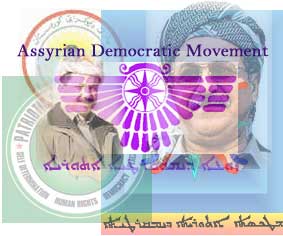

 (AINA) -- The May 26th municipal elections in the so-called "Safe Haven" in northern Iraq were once again muddied by discrimination against basic Assyrian political, civil, and human rights. In a lead up to the elections, the predominant Assyrian political party in northern Iraq, the Assyrian Democratic Movement (ADM) sensed that the impending elections were jury-rigged and consequently prepared for a possible boycott of the election.
(AINA) -- The May 26th municipal elections in the so-called "Safe Haven" in northern Iraq were once again muddied by discrimination against basic Assyrian political, civil, and human rights. In a lead up to the elections, the predominant Assyrian political party in northern Iraq, the Assyrian Democratic Movement (ADM) sensed that the impending elections were jury-rigged and consequently prepared for a possible boycott of the election.
In the past few years, Behdanani and Sorani tribal chieftains have been at great pains to present themselves to the world as respecting political rights as well as diversity within their area of military occupation. In the recent past, international sympathy for the Behdanani-Sorani struggle for occupation of northern Iraq has greatly suffered on account of repeated accounts of Kurdistan Democratic Party (KDP) and Patriotic Union of Kurdistan (PUK) persecution of the indigenous Assyrians. Fearing still greater erosion of international support, the Behdanani and Sorani political organizations proposed a meeting with ADM leaders aimed at ensuring ADM participation in the election process. The hastily arranged meeting was held prior to the May 23 date that the ADM was scheduled to issue a formal election boycott declaration to Assyrians in northern Iraq.
In a surprise reversal, however, the May 23 ADM press release instead urged Assyrians to participate in the elections. Recognizing no real chance for fair elections or proportionate Assyrian success in the pre-rigged election process, the ADM claimed that later integrating elections would increase Assyrian representation in the future. The predetermined outcome of the election materialized as predicted by Assyrian political analysts with overwhelming victories for Behdanani tribal elites even in some mainly Assyrian towns with the token exception of 3 Assyrian towns including the most prominent, Sarsing.
ADM participation was desperately needed by the KDP-PUK alliance since the smaller Assyrian political parties in northern Iraq had already been pressured into compliance. It is now widely believed that the ADM-KDP meeting was highlighted by overt threats of violence against the Assyrian leadership throughout northern Iraq. Fearing more assassinations of Assyrian leaders as well as unprovoked attacks against unarmed Assyrian villages and civilians, the ADM leadership apparently acquiesced under duress.
"Democracy is not a commodity to be haggled over or a privilege to be granted or taken away. Assyrians have inalienable political rights."
Already sounding the alarm, Assyrian leaders in the Diaspora have described this as "gun barrel democracy." In an interview with Mr. Abgar Maloul of the Assyrian Democratic Organization (ADO), Mr. Maloul stated "Coercing political participation by threats is not consistent with democracy." He added, "Democracy is not a commodity to be haggled over or a privilege to be granted or taken away. Assyrians have inalienable political rights. Assyrians have the right to elect their own officials at any level of government. If those in northern Iraq do not appreciate that basic right, then how do they differentiate themselves from the government in Baghdad? We remain deeply troubled by reports of intimidation or threats against Assyrians anywhere in the region." Alluding to future action in the Diaspora, Mr. Maloul added that "It is unreasonable to expect Assyrians to remain silent in light of these reports."
Even prior to the overt threats made by the Behdanani-Sorani coalition leaders, some Assyrians spanning the political spectrum had been apprehensive about the contemplated election boycott out of fear of still greater reprisals by the PUK-KDP coalition. Assyrians were still vividly recalling the assassination of the Assyrian governor of Arbil, Mr. Franso Hariri whom most Assyrians suspect had been killed by KDP insiders intent on removing an Assyrian from political prominence within the KDP. In another example, in their 1995 human rights report on northern Iraq, Amnesty International squarely blamed the KDP in the assassination of an ADM leader, Mr. Francis Shabo, whose chief responsibility as a member of parliament in northern Iraq was the adjudication of land claims by Assyrians against illegal settlement by Behdanani and Sorani tribesmen.
As if to underscore KDP-PUK threats against Assyrian civilians, Behdanani villagers and security forces from Ozman and Naveshga surrounded and attacked the Assyrian village of Koso on May 17th at 2:00 a.m. There were reports of severe beatings requiring hospitalization. The exact excuse for the attack is not known, but the attack itself and the subsequent inaction by the authorities is believed to have been a warning to Assyrian leaders contemplating a boycott. The attack on Koso is reminiscent of the earlier KDP attacks on the Assyrian villages in the Nahla region. In the aftermath of those midnight raids into Assyrian villages, KDP security forces continued to threaten Assyrian leaders until they signed a KDP drafted letter denying that such attacks ever took place. KDP tribal leaders were politically embarrassed when their primitive disinformation scheme was exposed with independent confirmation of the attacks by the United Nations and the International Committee of the Red Cross.
For years now, the KDP and PUK political leadership have struggled to reconcile two mutually exclusive currents in their struggle for occupation of northern Iraq - namely, their desire for an area of northern Iraq ethnically cleansed of its indigenous Assyrian residents and, their need to present themselves internationally as democratically respectful of Assyrian rights. Having failed at convincing Assyrian leaders in northern Iraq that Assyrian political rights will be formally and institutionally respected, the KDP and PUK have instead decided to threaten Assyrians into participating in a political process predetermined to guarantee a spiraling deterioration of Assyrian political rights within the very heartland of Assyria.

or register to post a comment.